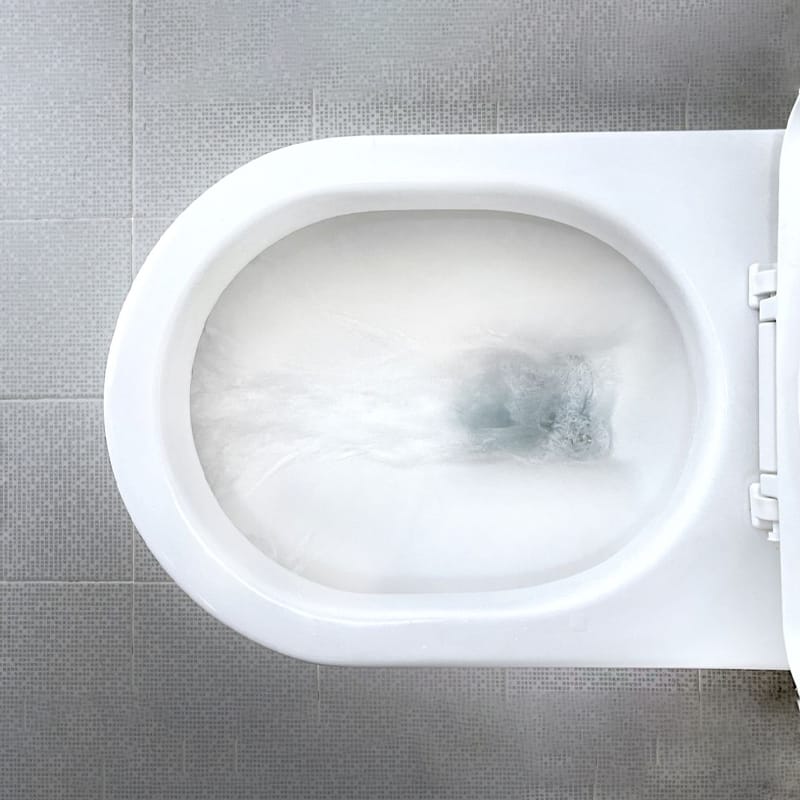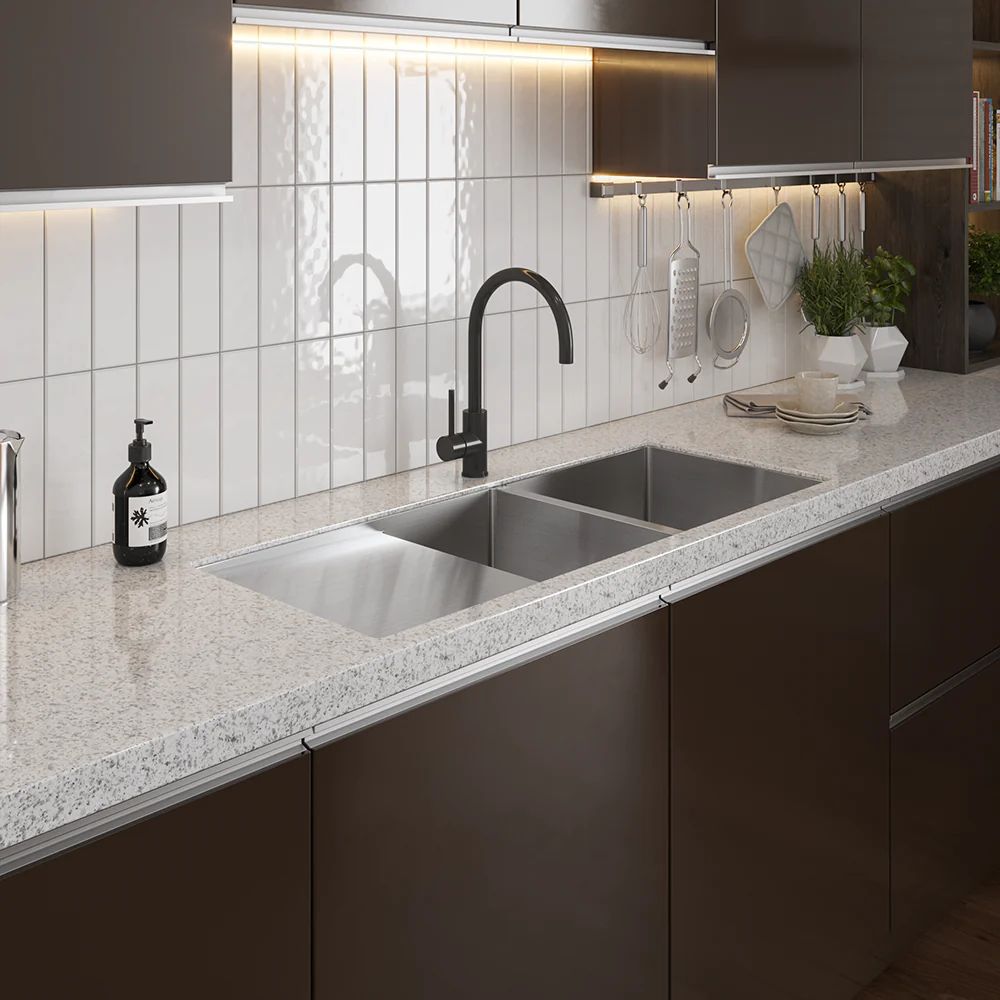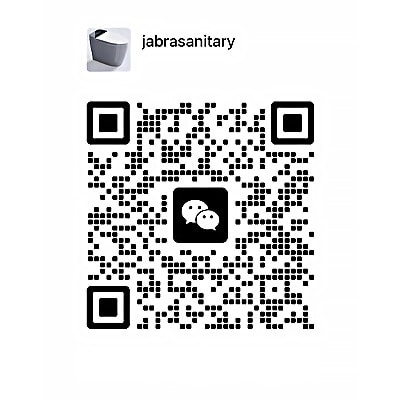 English
English
Jabra Sanitary is a sanitaryware supplier offering toilets, sinks, faucets, bathtubs, etc., at competitive prices. If you're a distributor, wholesaler, or project contractor, get a quote today!
 $23.9 Limited-time Offer
$23.9 Limited-time Offer Consignment Policy
Consignment Policy 20 Years of Experience
20 Years of Experience
Toilets are no longer just functional fixtures—they have become an integral part of bathroom design. Different-colored toilets reflect personal style while complementing the surrounding decor.
This guide explores 21 popular color toilets, ranging from classic white to bold black and everything in between, offering inspiration for diverse design preferences.
Whether aiming for a contemporary, vintage, or minimalist vibe, the right toilet color can be the ultimate finishing touch to achieve your dream bathroom. Read on to discover the perfect hue that aligns with your decor style while maintaining functionality and sophistication.
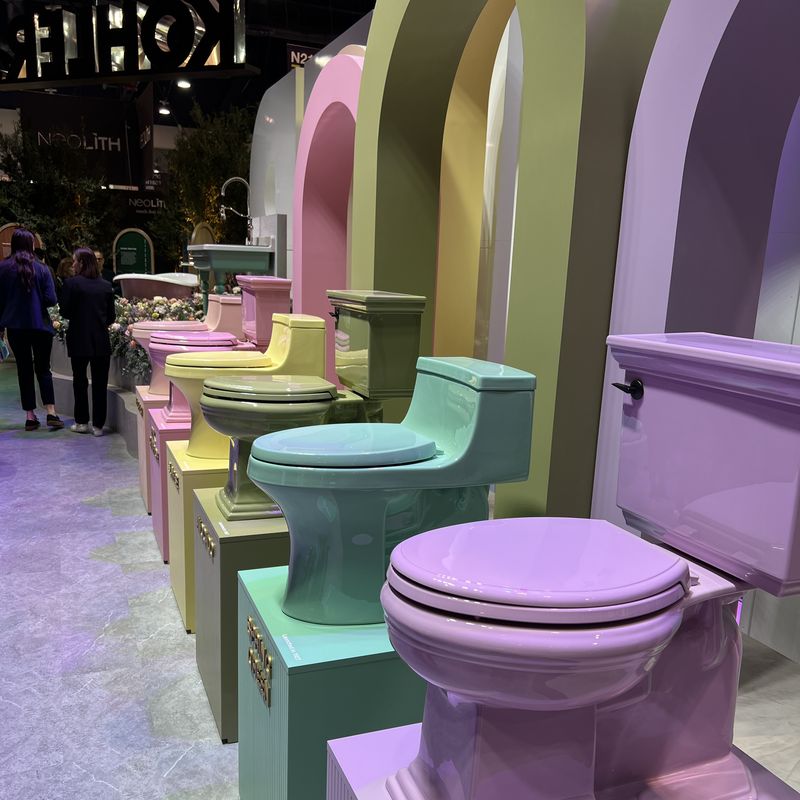
Table of Contents
What Colors Do Toilets Come In
Why Are Common Toilets White
Which Color Is Best for a Toilet?
What Brand Sells Different Color Toilets?
Do Toilet Seat Colors Need To Match The Rest Of The Toilet?
How to Identify Toilet Color?
FAQs
Conclusion
What Colors Do Toilets Come In
Gone are the days when white was the only option for toilets. Today, toilet manufacturers offer an impressive variety of colored toilets to suit every decor style and personal preference.
Below is a breakdown of what colors do toilets come in, categorized for your convenience:
1. White Toilets
White toilets are the most common and timeless option. Known for their clean and versatile appearance, they seamlessly blend with any bathroom style, from classic to modern.
White exudes simplicity and hygiene, making it a favorite choice for homeowners and designers alike.
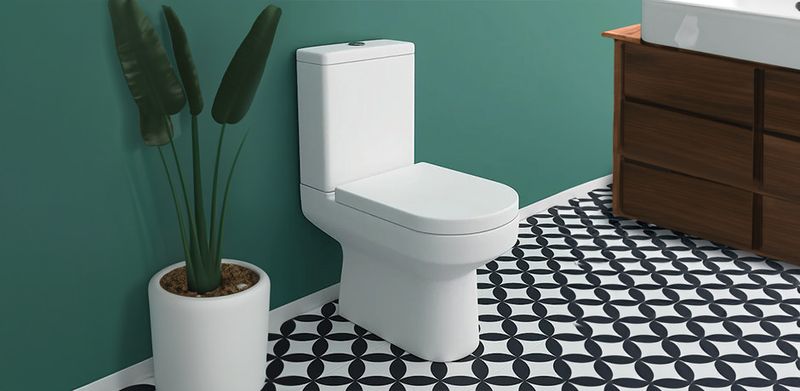
2. Beige Toilets
Beige toilets bring a touch of warmth and subtle elegance to bathrooms. This neutral shade complements earthy tones and is perfect for traditional or rustic designs.
Consider using contrasting elements like bright wallpaper, live plants, or tile.
3. Cream Toilets or Biscuit Toilets
Cream or biscuit toilets offer a softer alternative to white, adding a hint of sophistication. They pair beautifully with warm-colored tiles and fixtures, creating a cohesive look.
4. Black Toilets
Black toilets make a bold statement, exuding luxury and drama. These black toilet bowls are ideal for modern or industrial bathrooms, offering a striking contrast to lighter decor.
You can go the opposite route and pair a black toilet with bright elements in your bathroom for a bold contrast that adds sophistication and energy to the space.
For example, you can pair a black toilet with white or light-colored walls, a sleek marble countertop, and vibrant, colorful accessories like towels or plants to create a striking contrast while keeping the space fresh and balanced.
5. Light Blue Toilets
Light blue toilets evoke calmness and serenity. This color is ideal for coastal or spa-inspired bathrooms, adding a soothing aesthetic. They can be perfectly paired with white or neutral-toned walls and soft natural textures like wood or linen.
6. Bright Blue Toilets
Bright blue toilets add a pop of vibrancy, making them an excellent choice for eclectic or contemporary spaces. They create a lively focal point when matched with minimalist decor or sleek, modern fixtures.
7. Yellow Toilets
Yellow toilets radiate cheerfulness and warmth, perfect for creating a lively and inviting bathroom atmosphere. They work well in eclectic or retro-style bathrooms.
Try to tie it together with yellow accents in the space, such as yellow candles, yellow bathmats, yellow towels, and vibrant art.
8. Grey Toilets
Grey toilets are versatile and chic, offering a modern yet understated appeal. They fit seamlessly into minimalist or industrial-inspired bathrooms. A grey toilet bowl can be paired with a variety of design elements for a sleek, modern look.
For example, you can combine it with light marble or white tiles for a clean, minimalist aesthetic. To add warmth, pair it with wooden accents such as a wooden vanity or shelving.
If you prefer a bold look, contrast the grey toilet with dark-colored walls, like charcoal or navy, and incorporate gold or matte black fixtures for a touch of luxury. Adding plants or greenery can also soften the look, bringing a natural element to the modern design.
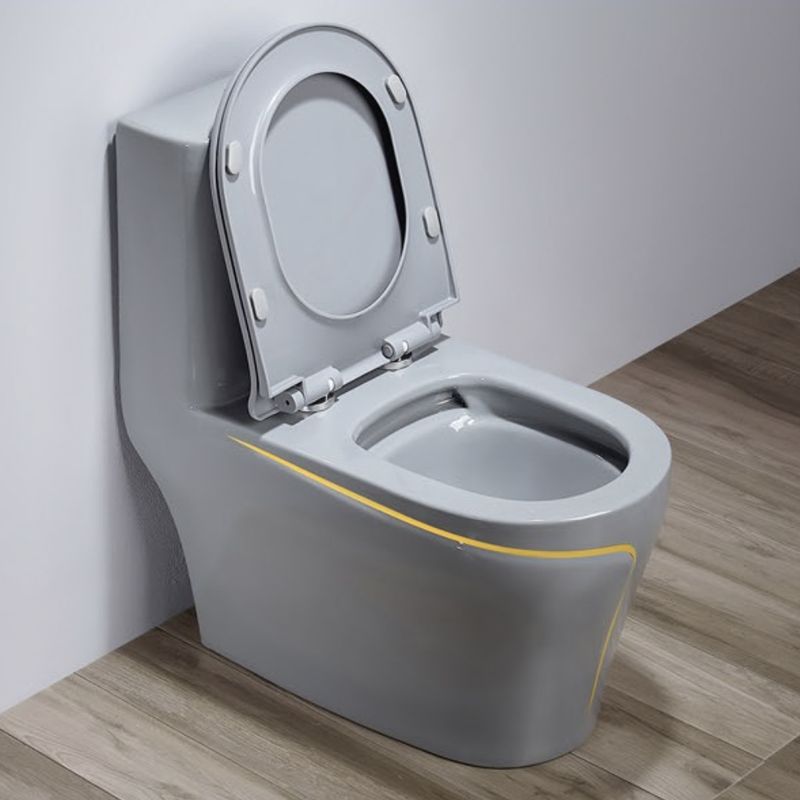
9. Tan Toilets
Tan toilets have a natural and earthy tone. They are ideal for creating a rustic or nature-inspired bathroom look.
It pairs beautifully with soft, neutral walls like beige or off-white, and works well with natural materials such as wood or stone for a rustic or organic feel.
To add contrast, you can complement the tan toilet with bold, dark-colored accents like navy or deep green for a sophisticated touch.
For a more relaxed vibe, combine it with pastel shades, like light blue or mint green, along with light wood or woven textures to create a calm, spa-like environment.
10. Gold Toilets
Gold toilets bring an air of opulence and luxury. Often seen in high-end or glam-style bathrooms, they add a lavish focal point.
It pairs beautifully with deep, rich tones like navy, black, or dark green to create a dramatic, high-end look.
For a more balanced and elegant design, combine a gold toilet with neutral colors like white, cream, or light grey to let the golden accents stand out without overwhelming the space.
Adding marble or glossy finishes, such as a white marble countertop or gold fixtures, can enhance the sophisticated feel. To soften the boldness, you can introduce soft textiles like plush towels or a patterned rug in complementary tones.
11. Red Toilets
Red toilets are bold and unconventional, perfect for making a statement in adventurous or retro bathroom designs.
A red toilet will create a strong focal point in your bathroom, so try for darker elements such as a black countertop and checkered tile to create contrast.
12. Pink Toilets
Pink toilets add a touch of vintage charm, often seen in mid-century bathroom styles. They also bring warmth and softness to whimsical designs.
To balance the boldness of the pink, pair it with soft neutral tones like white, light grey, or beige for the walls and flooring.
For a more vintage or retro vibe, consider adding patterned tiles or floral wallpaper in complementary shades. If you prefer a modern twist, combine a pink toilet with sleek black or charcoal accents to create a striking contrast. Gold or brass fixtures can also elevate the look, adding a touch of elegance to the fun, vibrant tone of the pink.
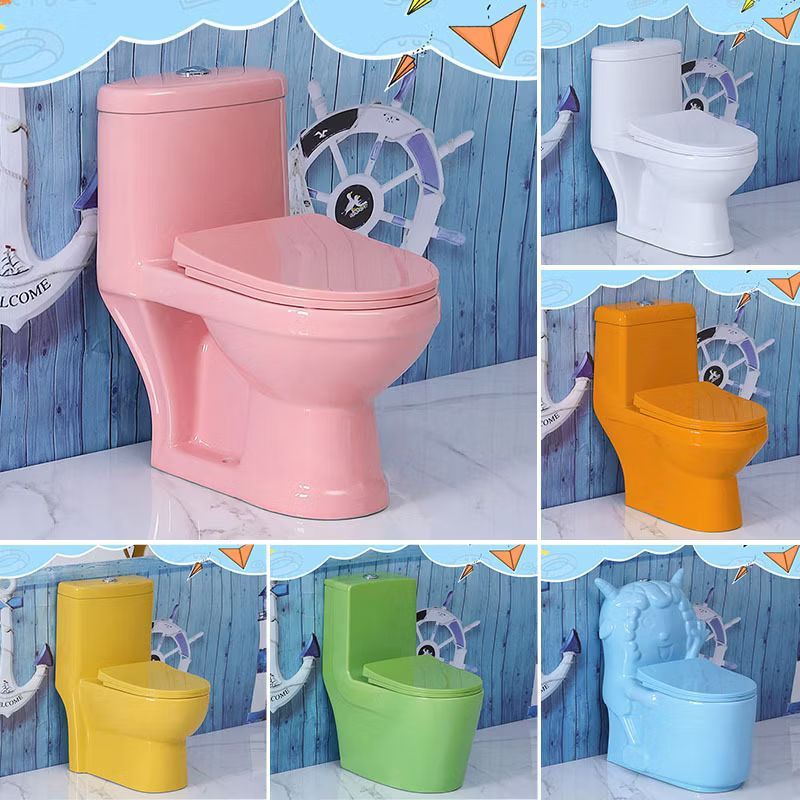
13. Turquoise Toilets
Turquoise toilets are vibrant and refreshing, reminiscent of tropical vibes. They work well in modern and fun bathroom spaces.
To balance the boldness of turquoise, pair it with neutral walls in white, light grey, or sandy beige for a clean, modern look. For a coastal or spa-inspired theme, combine the turquoise toilet with natural materials like wood or stone, as well as soft aqua or seafoam green accents.
To make a bolder statement, you can contrast the turquoise with darker shades like navy or charcoal, along with chrome or matte black fixtures for a sophisticated touch. Adding tropical or leafy plants can further enhance the vibrant and lively atmosphere.
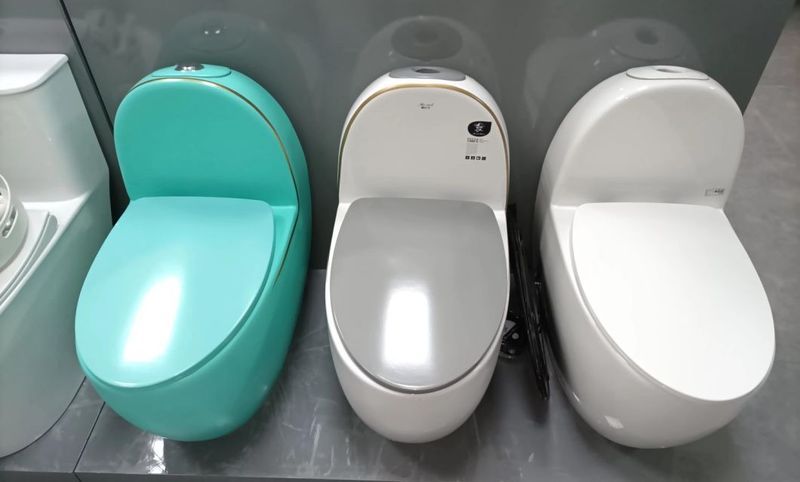
14. Maroon Toilet
Maroon toilets are rich and dramatic, adding warmth and depth to traditional or sophisticated bathroom interiors. Contrast the bold color scheme of maroon with black and white fixtures.
To complement the boldness of maroon, pair it with light, neutral walls such as soft beige, cream, or light grey to create a balanced, elegant look.
For a more dramatic effect, you can contrast the maroon with darker shades like charcoal or black, using sleek fixtures in matte or polished gold to add a touch of luxury. If you prefer a cozy, vintage feel, combine maroon with earthy tones like warm wood accents, terracotta, or brass lighting.
To keep the space feeling fresh, introduce crisp white towels or soft pastels as accents for contrast and brightness.
15. Slate Toilets
Slate toilets are trendy and versatile, offering a muted greyish tone that pairs beautifully with contemporary decor.
To highlight the beauty of slate, pair it with light-colored walls such as soft white, pale grey, or warm beige for a clean, minimalist aesthetic.
For a more dramatic contrast, combine slate with darker elements like charcoal or black accents, creating a modern, high-end feel. You can also pair slate with natural textures like wood or stone to bring an organic, earthy vibe to the space.
Polished chrome or matte black fixtures can complement the slate toilet perfectly, while adding plants or greenery softens the overall design and introduces a fresh, natural element.
16. Orange Toilets
Orange toilets are bold and energetic, ideal for eclectic designs where vibrant colors create a standout feature.
You want darker colors to compliment the space, so use orange for your bathmat, your towels, and your handles.
17. Indigo Toilets
Indigo toilets are deep and luxurious, perfect for bathrooms seeking a unique yet elegant focal point. Pair this with gold and white fixtures.
18. Brown Toilets
Brown toilets offer a natural and grounded feel, perfect for earthy bathroom designs with wood or stone accents.
For brown toilets, you can pair wood with more muted colors, such as dark green or grey. Other wooden elements, such as cabinets, shelves, or vanities, complement nicely.
19. Hunter Green Toilets
Hunter green toilets add a bold and nature-inspired touch, ideal for traditional, rustic, or botanical-themed bathrooms.
To balance this rich hue, pair it with neutral walls in shades like light grey, cream, or soft white to maintain a fresh, airy feel.
For a more dramatic and moody look, combine the hunter-green toilet with darker elements such as charcoal or navy, and add gold or brass fixtures for a touch of elegance.
To soften the intensity, you can introduce warm wooden accents, like a wooden vanity or shelving, which creates a natural contrast. For a touch of nature, incorporate greenery or plants that complement the deep green, enhancing the calming and grounded atmosphere of the space.
20. Pistachio Toilets
Pistachio toilets are soft and retro-inspired, blending well with pastel palettes and vintage bathroom styles. If you choose pistachio as a toilet color, pair it with wooden vanities/cabinets and add a shelf with live plants.
21. Matte Black Toilets
Glossy black toilets create a more bold, glamorous statement in the bathroom, while matte black toilets are ideal for a softer, modern look.
The modern finish exudes sophistication and bold style. To make the most of their striking look, pair them with light, neutral walls such as white, grey, or soft beige to create a clean contrast that highlights the matte black finish.
For a more contemporary, high-contrast design, you can combine matte black with white or marble elements—think white tiles, countertops, or even a marble backsplash—for a chic, minimalist vibe.
To add warmth and texture, incorporate natural wood accents or earthy tones, such as a wooden vanity or woven rugs. Metallic fixtures in matte gold, brass, or chrome can complement the matte black toilet and elevate the overall design.
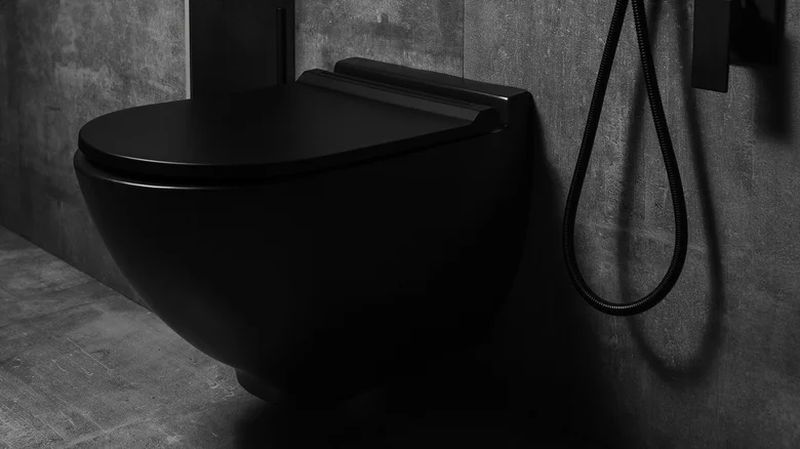
Why Are Common Toilets White
Toilets are predominantly white for several practical, aesthetic, and historical reasons. Here's a detailed explanation:
1. Hygienic Appeal
White symbolizes cleanliness and hygiene, a critical aspect of bathrooms. Its pristine appearance reassures users of sanitary conditions and makes spotting dirt or stains easier, encouraging regular cleaning.
2. Material Properties
Most toilets are made of porcelain, a durable and non-porous material. During manufacturing, porcelain is glazed with a white coating that enhances its smoothness and prevents the accumulation of bacteria.
White is also the natural color of the ceramic glaze used, simplifying the production process.
3. Cost-Efficiency
Producing white toilets is cost-effective. White glaze requires fewer pigments and less complex manufacturing processes compared to colored finishes. This affordability has contributed to the widespread availability of white toilets.
4. Universality and Versatility
White toilets blend effortlessly with any bathroom design, from modern minimalist to traditional styles. This universal appeal has made white the go-to choice for homeowners and designers.
5. Historical Preference
The preference for white toilets dates back to the early 20th century when indoor plumbing became common. White was associated with medical facilities and hygiene, cementing its status as the standard toilet color.
6. Perception of Space
White reflects light, creating the illusion of a larger and brighter bathroom. This is particularly advantageous in small or dimly lit spaces.
7. Timelessness
White toilets are classic and timeless, ensuring they don't go out of style even as bathroom trends evolve. Their neutral color provides longevity, making them a practical long-term investment.
Which Color Is Best for a Toilet?
Choosing the best-colored toilets depends on various factors, including personal preferences, bathroom size, factor in lighting, existing decor, and maintenance.
While white is the most popular choice due to its neutrality, other colors can make a bold statement or blend seamlessly into specific styles.
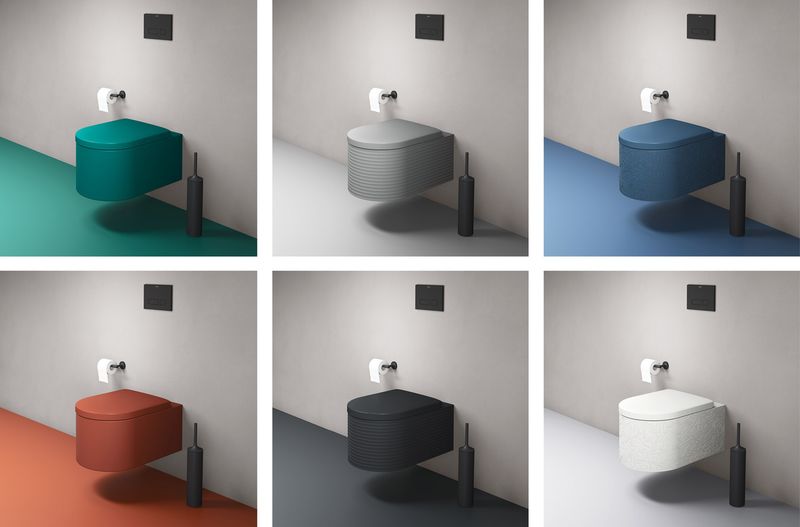
Here's an analysis to help you decide the best color for your toilet:
1. Classic White Toilets
Best for: Universality, cleanliness, and timeless appeal.
White is the safest and most versatile option. It complements all bathroom designs, creates a clean aesthetic, and ensures easy maintenance by making dirt and stains visible. White toilets also enhance the sense of space in smaller bathrooms by reflecting light.
2. Beige, Cream, or Biscuit Toilets
Best for: Warm and cozy bathroom designs.
These neutral tones add warmth and softness to your space. They work well in rustic, traditional, or farmhouse-inspired bathrooms, blending seamlessly with natural materials like wood or stone.
3. Black and Matte Black Toilets
Best for: Modern and luxurious designs.
Black toilets exude elegance and drama, making them ideal for high-end or contemporary bathrooms. However, they require regular maintenance as water spots and dust are more noticeable on dark surfaces.
4. Grey Toilets
Best for: Minimalist and industrial themes.
Grey toilets are a popular choice in modern bathrooms due to their understated elegance. They pair well with metallic fixtures and neutral color schemes, offering a sleek and cohesive look.
5. Light Blue or Turquoise Toilets
Best for: Coastal or spa-like themes.
Blue tones evoke a sense of calmness and serenity. They're perfect for bathrooms aiming to replicate a beachside or relaxing retreat vibe.
6. Bright Colors (Yellow, Pink, Red, Orange)
Best for: Bold and artistic designs.
Vivid hues like yellow, pink, and red bring vibrancy and personality to bathrooms. These are great for eclectic or retro styles but should be used sparingly in smaller spaces.
7. Earthy and Natural Tones (Brown, Tan, Hunter Green, Pistachio)
Best for: Nature-inspired bathrooms.
These colors harmonize well with organic elements like bamboo, stone, and greenery. They create a tranquil and earthy ambiance.
8. Gold Toilets
Best for: Opulent and luxurious spaces.
A gold toilet makes a statement of wealth and extravagance. It's ideal for glamorous bathrooms but requires careful pairing with other elements.
9. Pink and Maroon Toilets
Best for: Retro and vintage aesthetics.
These colors are often used in mid-century bathroom designs. They add charm and nostalgia to a space while creating a unique visual interest.
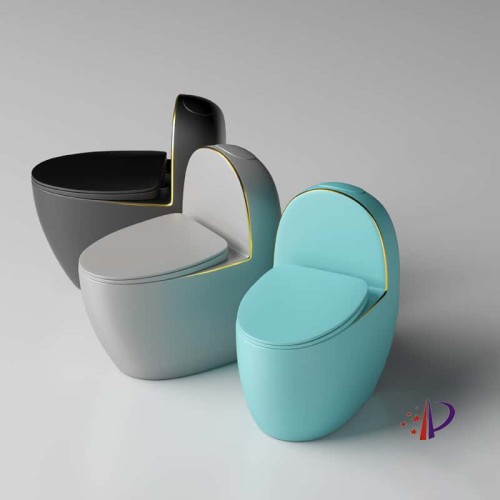
Colorful Egg Shaped Toilet
WThe different color toilets 2420 series is a testament to innovative bathroom design, offering a refreshing twist on traditional white fixtures with its array of different color toilets.
What Brand Sells Different Color Toilets?
When it comes to choosing the perfect toilet colors for your bathroom, the right toilet brand can make all the difference.
Not only do well-known toilet brands offer a wide variety of color options, but they also bring quality, reliability, and innovative designs to match. Let's explore three major players in the market and the different color options they offer.
1. Toto
Toto is renowned for its sleek designs, modern features, and innovative technology. Toto toilets are known for their durability, ease of cleaning, and water-saving features.
Toto offers a selection of colors that can complement a wide range of bathroom styles, from classic to contemporary.
Here are some popular toilet colors and the color availability.
Popular Toilet Colors |
Toto Color Availability |
|
Cotton White |
A clean, bright white that's a staple in many modern bathrooms. |
Toto toilets come in a wide variety of colors, but it's important to note that color availability may depend on the specific model and series. So always check the options for your chosen toilet. |
Sedona Beige |
A warm, earthy tone perfect for earthy, natural design schemes. |
|
Bone |
A slightly off-white color that adds a subtle touch of elegance. |
|
Grey |
A contemporary, sophisticated choice for a more modern or industrial bathroom. |
|
2. American Standard
American Standard is another trusted name in the bathroom industry, offering a wide range of high-quality toilets that cater to both traditional and modern tastes.
American Standard color palette is diverse and flexible, with options designed to complement any bathroom decor. Here are some popular toilet colors and the color availability:
Popular Toilet Colors |
American Standard Color Availability |
|
White |
A timeless classic that suits any style, from traditional to contemporary. |
American Standard offers a broad selection of colors for their toilets, and many of their models come in at least three or four different shades. As with Toto, always verify the color options when selecting a model. |
Linen |
A warm, off-white tone ideal for creating a cozy, inviting atmosphere. |
|
Bone |
A soft, neutral color that works well with traditional or rustic designs. |
|
Black |
Bold and sleek, a black toilet can make a statement in a modern or minimalist bathroom. |
|
3. Jabra Sanitary
Jabra Sanitary is a newer player in the sanitary ware industry but is quickly gaining recognition for its quality products and innovative designs.
Jabra toilets often feature modern aesthetics, with an emphasis on water-saving technologies and eco-friendly materials. Here are some popular toilet colors and the color availability:
Popular Toilet Colors |
Jabra Sanitary Color Availability |
|
Pure White |
A crisp, bright white that provides a clean and sophisticated look. |
Jabra Sanitary provides a selection of colorful toilets that suit modern bathrooms. Jabra sanitary brand also frequently introduce new colors as part of seasonal collections. You are free to choose from a wide range of colors for different toilet models. |
Matt Black |
An unsaturated shade of black low in brightness and non-reflective or shiny. |
|
Grey |
A modern and trendy color that works especially well in contemporary or industrial-style bathrooms. |
|
Other Colors |
Green, blue and orange. |
|
Do Toilet Seat Colors Need To Match The Rest Of The Toilet?
Whether your toilet seat should match the toilet bowl depends on your bathroom's style and your personal preference. Many bathrooms use matching toilet seats and bowls for a clean and uniform look.
However, modern trends now embrace contrasting toilet seat colors to add style and interest to the space.
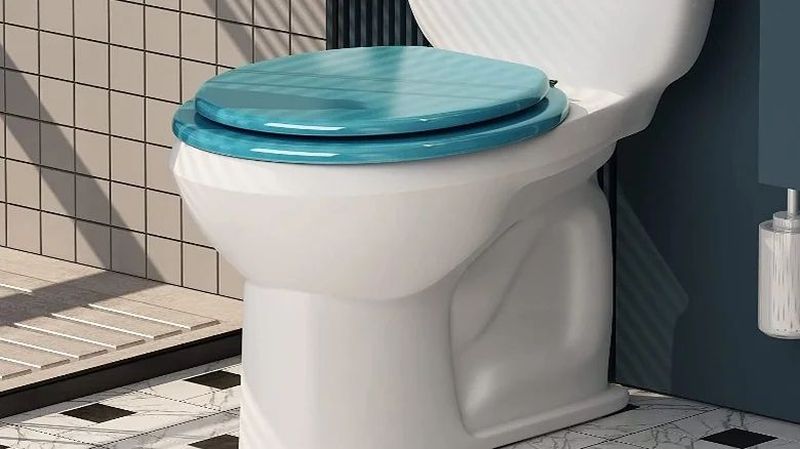
It's also important to think about how the seat color fits with other elements in your bathroom. If your bathroom has colorful walls or tiles, a contrasting toilet seat can help tie everything together.
For more neutral bathrooms, a matching seat will keep the space calm and cohesive. Functionality matters too when choosing toilet seat colors. A matching seat blends easily with the rest of the toilet, making cleaning simple.
Contrasting colors like black or dark gray can hide stains better, which is useful in busy bathrooms. In the end, whether the toilet seat matches the toilet bowl comes down to your style. Whether you prefer a uniform look or a bold contrast, make sure the seat complements your bathroom's design and is easy to maintain.
How to Identify Toilet Color?
Identifying the exact toilet colors can sometimes be tricky, especially if it has faded over time or if you're trying to match it with new accessories.
There are several practical methods to help you determine the different colored toilets.
1. Check the Space Between the Bowl and the Seat
One of the easiest ways to identify the toilet colors is to examine the area between the toilet bowl and the seat. This part of the toilet is often sheltered from direct exposure to water, cleaning agents, and sunlight.
Therefore, it may retain its original color more accurately. If you lift the seat and look at this hidden space, you may find a good match to the original shade of your toilet.
2. Inspect the Inside of the Tank
Another useful area to check is the inside of the toilet tank. Many toilets have the color information stamped or printed on the inside of the tank, often near the base or on the underside of the lid.
Some toilet manufacturers label their toilets with specific color codes or names in this area.
3. Look Under the Tank Lid
Sometimes, identifying the color may be as simple as lifting the tank lid. In addition to the manufacturer's information or model number, the lid might also have color-related markings. Some toilets, particularly older models, have color information printed or labeled under the lid.
4. Use Pantone Color Swatches
If you're still unsure about the exact toilet colors, you can use a Pantone color guide or color swatches. These swatches help you match the toilet's shade to a standardized color system.
The system can be especially useful if the toilet color has faded or if you're trying to match it with other bathroom elements like tiles or fixtures.
FAQs
What color toilets are popular?
The most popular toilet color is white, which fits any bathroom style. Black toilets are gaining popularity for their bold and modern look. Other trendy colors include gray, beige, blue, and green for a unique touch.
Where can I buy a blue toilet?
You can find blue toilets at stores like Home Depot, Lowe's, Jabra Sanitary, and online retailers like Amazon and Wayfair. Brands such as Toto, American Standard, and Gerber may offer blue options or custom colors.
Can I paint my toilet a different color?
While it's possible to paint your toilet, it's not recommended because paint can peel over time. It's better to replace the seat or use colored accessories for a long-lasting look.
Why are colored toilets more expensive?
Colored toilets are typically more expensive than standard white ones for several reasons:
- Complex Manufacturing: Making colored toilets requires extra steps, like special glazing and coloring, which increases production costs. These colors also need to be durable to prevent fading, adding to the expense.
- Limited Demand: Since colored toilets are less common, they are often made in smaller quantities, which makes each unit more costly.
- Special Materials: Some colors need special pigments or dyes that are pricier than the standard white finish.
- Premium Positioning: Colored toilets are marketed as luxury or designer items, so manufacturers price them higher to reflect their exclusivity.
- Higher Logistics Costs: Colored toilets might be made in different factories or regions, leading to higher transportation costs.
In short, the extra manufacturing steps, limited production, and use of specialized materials make colored toilets more expensive.
Why choose a black toilet?
A black toilet is stylish, hides stains well, and works with many bathroom designs, from modern to vintage.
Conclusion
Choosing the right toilet colors is more than a practical decision. It's a way to express your style and elevate your bathroom design. With 21 toilet color options available, from timeless white to bold black and vibrant shades, there's a perfect match for every aesthetic.
When selecting a toilet color, think about how it complements your bathroom's overall design, including wall colors, tiles, and accessories. Also, the toilet seat color does not necessarily match the rest of the toilet. It depends on personal preferences.
Are you interested in different colored toilets? Contact us for any questions and transform your bathroom into a vibrant space.









